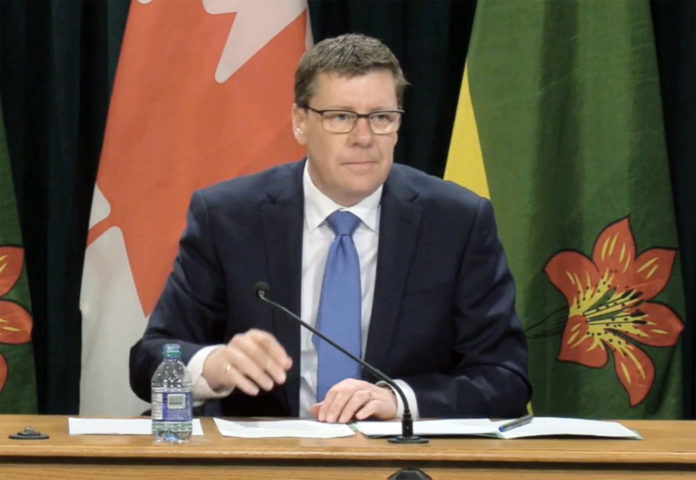
Saskatchewan has to be ready for regional and local flare-ups of COVID-19 even as active cases continue to fall, Premier Scott Moe said Friday.
Moe’s comments came in a press conference that touched on wide-ranging issues from current case counts to an outbreak of COVID-19 in care homes to oil and gas subsidies to revenue projections.
Moe called Friday “another positive day” as the number of active cases fell for the 11th time in 12 days. The number of active cases hasn’t risen since April 5. It’s fallen each day since then, with the exception of one day where it remained static.
Friday continued that trend, with two new cases and nine new recoveries bringing the number of active cases to 75, a reduction from 92 one day prior. The cumulative total sits at 307.
Of active cases, six are recovering in the hospital, with one in the ICU.
Of the province’s cases, 133 are related to travel, 129 are community contacts or linked to mass gatherings, 29 have no known exposures and 16 are under investigation by local public health.
There have been no additional deaths from COVID-19. The provincial total remains at four.
Saskatchewan announced the age groups it includes in reports have been updated to better align with national data.
Twenty-three cases involve people 19 or younger, 110 are int he 20-39 age range, 105 in the 40-59 age range, 62 are aged 60-79 and seven are in the 80-plus range.
A total of 22,207 tests have been performed in the province. Some people have been tested more than once. Saskatchewan has the second-highest rate of testing per capita among provinces.
The good news, though, was dampened by word that public health was tracking a pair of outbreaks in care homes.
“While our numbers are very low, we can probably continue to expect some localized outbreaks from time to time,” Moe said. He added that when outbreaks do occur, Saskatchewan has the ability to trace, isolate and test cases “quickly and effectively.
“Our health system is poised to respond.”
He thanked residents for continuing to work to flatten the curve.
Moe said the parameters and plan to gradually reopen some closed businesses will be announced next week. He said previously this week that while some restrictions may be eased, the province won’t be throwing the door open any time soon
“As we go through the next number of weeks and months, until such time as there’s a vaccine eventually, we cannot prevent everyone from contracting COVID-19,” Moe said.
“What we can do is slow the spread of the virus by appropriate physical distancing, by identifying where our high-risk residents are — like in long-term care homes.”
He said when local flare-ups arise — and they will — “in all corners of this province over the next number of months,” it will come down to providing the appropriate and proper health care.
Moe said the logic behind re-opening some businesses is to start to allow people to go to work and stem some of the economic declines.
The largest impact, he said, will be on the general finances of households from community to community.
NDP leader Ryan Meili also spoke to reporters on Friday. He reiterated his call for some form of collaboration or other tools to hold the government accountable and hear from more voices as the province plans its pandemic response. He doesn’t want to lay blame, he said, but rather ensure Saskatchewan’s response is the best it can be.
He said he’s encouraging the best plan now.
“That’s my focus rather than figuring out who’s going to be blamed down the road.”
While Shahab and Moe spoke about protecting vulnerable populations Friday, Meili argued that’s the voices that have been missing thus far in the province’s pandemic response and the ones that need to be heard as it moves forward.
“Seniors, First Nations communities and folks in shelters — those are three areas we have not yet seen actions for full protection,” Meili said.
He argued health labour unions and northern and Indigenous voices haven’t been adequately included at the decision-making table.
“We have yet to see any meaningful interaction from provincial leadership,” he said.
“Some measures of having oversight and accountability is absolutely essential.” Meili said an all-sector, all-party task force is the best option.
It could include both in-person social distanced approaches and virtual gatherings, he said.
“Whatever that mechanism is, this government needs to meaningfully involve leaders in labour, in health care unions. First Nations and Métis communities are not getting the information … and influence they should to protect their communities. Municipalities as well. Improvement in that communication is key.
“This to me, and the roles of municipal leaders, is a massive oversight and one of the big risks to us as a province.”
Moe said he’s been on the phone with Federation of Sovereign Indigenous Nations (FSIN) Chief Bobby Cameron, as well as leaders in First Nations and northern communities.
‘That conversation continues,” he said.
‘Where we have landed thus far is a number of those communities are in essence restricting travel in and out of their communities and they have been asked that they be allowed to do that. We’re working closely with our northern communities on restricting travel and who should do it. We’re happy to have that conversation with them and happy to continue having that conversation with them.”

